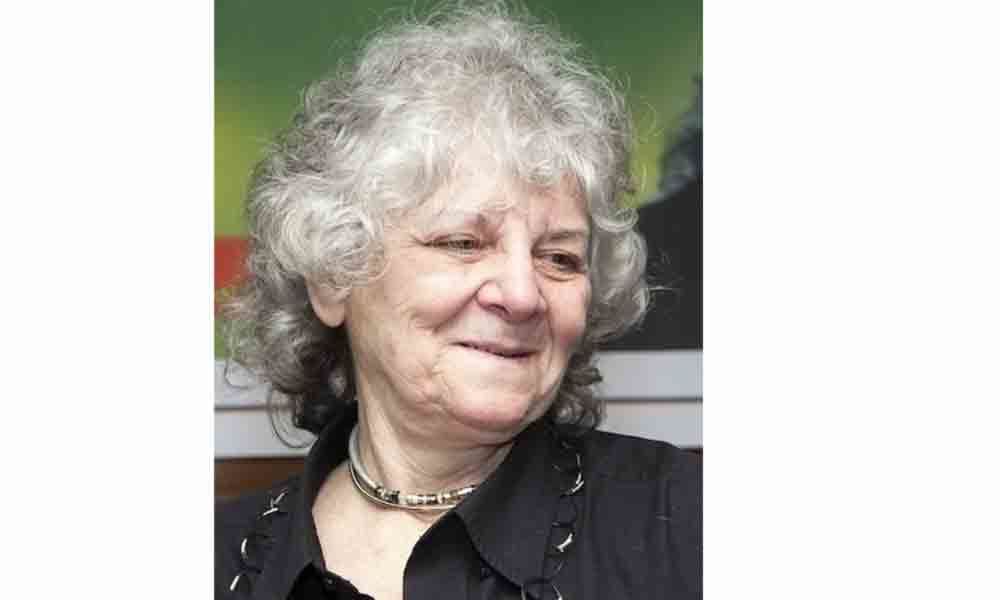Live
- Union Cabinet condoles demise of Dr. Manmohan Singh
- Adani Ports places India's largest order for tugs worth Rs 450 crore with Cochin Shipyard
- NASA confirms Parker Solar Probe safe after flying dangerously close to Sun
- Remembering Dr. Manmohan Singh: Timeless Words of Wisdom From India’s Visionary Leader
- Challenges in Implementing POSH Policy in Workplaces
- Will Sukumar "Quit cinema"?
- BFI chief Ajay Singh appointed board member in new Asian body; Lovlina part of Athletes' Commission
- Jharkhand declares seven-day state mourning in honour of Manmohan Singh
- Weather alert: AP to receive rains today as low pressure in Bay of Bengal weakens
- Virtual Hearing Completed; Allu Arjun Excused from In-Person Court Appearance Until January 10th
Just In
Being a woman in science isn't easy: Nobel laureate Ada Yonath


A UNESCO report found that only 35 per cent of STEM students in higher education globally are women
Israeli crystallographer Ada Yonath -- whose pioneering work on the structure of the ribosome won her the Nobel Prize in 2009 -- has one advice for women struggling to make a mark in science, technology, engineering, and mathematics (STEM): Forget what society thinks and go after what you want. At the 69th Lindau Nobel Laureates meeting here, the 80-year-old scientist admitted to PTI in an interview that it isn't easy being a woman scientist.
"Science is very demanding. It isn't easy being a woman in science. While at least 40 per cent students in my classes at school and university were women, the number was much lower when I was pursuing higher studies in science. But my mother was my pillar of strength and always told me to follow my dreams," Yonath said. While, theoretically there is nothing holding women back, STEM industries remain male dominated arenas.
A UNESCO report found that only 35 per cent of STEM students in higher education globally are women, and differences are observed within STEM disciplines. For example, only three per cent of female students in higher education choose information and communication technologies (ICT) studies, the report said. This gender disparity is alarming, especially as STEM careers are often referred to as the jobs of the future, driving innovation, social wellbeing, inclusive growth and sustainable development. Breaking barriers in science was no easy feat for Yonath who hails from a very humble background.
"My father died when I was young, leaving us very poor," said Yonath who is associated with of the Weizmann Institute of Science in Rehovot, Israel. However, Yonath's family knew at an early age that her academic future would be bright. "I was good with science but I actually wanted to be a writer. I used to fantasise a lot and wanted to write books. It was another thing that I could not write at all," the septuagenarian, who has been to India many times, chuckled.
According to a 2018 study published in the journal Psychological Science, the underrepresentation of girls and women in STEM fields is a continual concern for social scientists and policymakers. Yonath was awarded the 2009 Nobel Prize in Chemistry jointly with India-born Venkatraman Ramakrishnan and Thomas A Steitz for studies of the structure and function of the ribosome -- the cell's machinery for churning out proteins from the genetic code. "Winning the Nobel Prize was great, but the more important thing was the result we had got. It was overwhelming," Yonath said. "There are many people who have done fantastic science; many better than me, but there are only three prizes for each category. It is not possible for everyone to receive it," she added.

News
Company
Entertainment
© 2022 Hyderabad Media House Limited/The Hans India. All rights reserved. Powered by hocalwire.com






